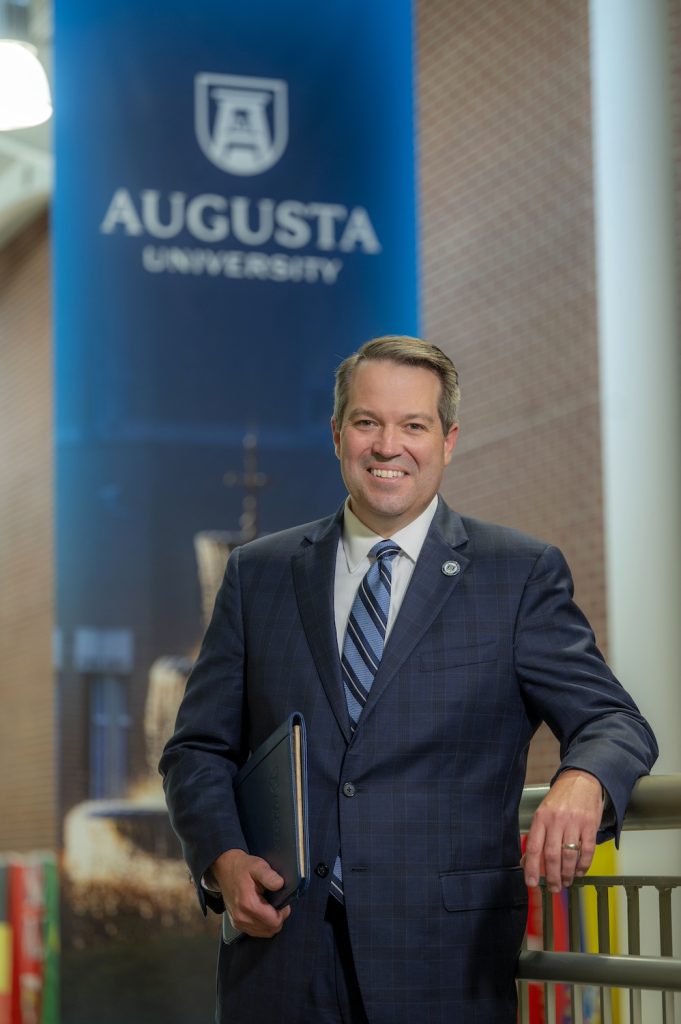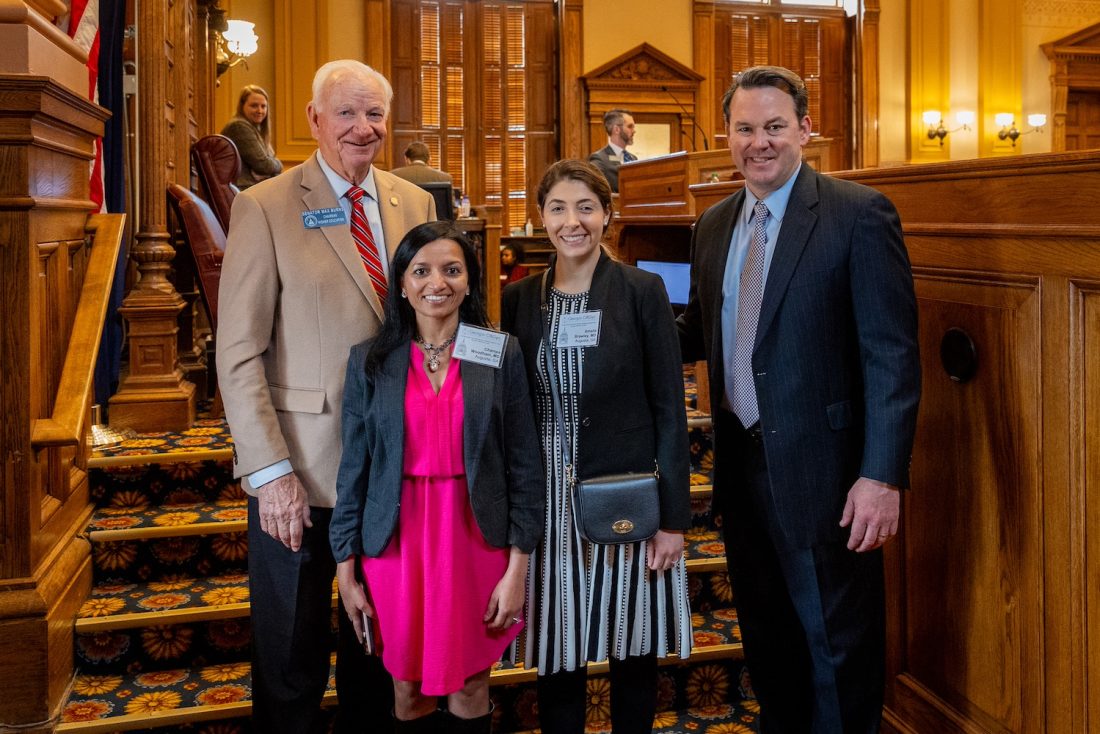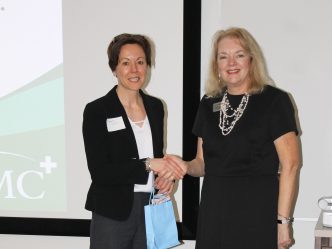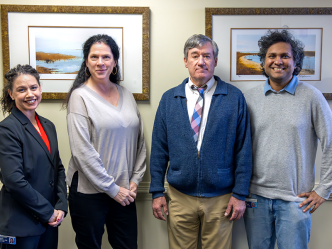Augusta University’s first maternal fetal medicine fellow, Amalia Brawley, MD, traveled to Atlanta this past week for the Georgia OB-GYN Society’s 2025 Legislative Day at the Capitol.
Last semester, Brawley became part of the Medical College of Georgia at Augusta University and Wellstar MCG Health’s new three-year Maternal Fetal Medicine Fellowship program that offers a balance of clinical and research exposure and will accept one fellow per year.
Brawley, who recently completed her OB-GYN residency at Penn State Health’s Milton S. Hershey Medical Center, said she proudly accepted the new fellowship position at MCG in August.
“Honestly, I knew pretty early on, probably during my first year of medical school, that I wanted to go into OB-GYN and go into maternal fetal medicine specifically,” Brawley said. “I always had an interest in pregnancy physiology and in fetal physiology and neonatal problems.”
“There is a lack of obstetrics providers within the state and women from rural areas, in particular, suffer that disparity at much higher rates. In fact, here in Georgia, the majority of counties have no maternal fetal medicine specialists. Augusta University is working to improve the health of mothers and their infants across Georgia.”
Augusta University President Russell T. Keen
The new Maternal Fetal Medicine Fellowship was approved by the Accreditation Council for Graduate Medical Education and funded by the Georgia General Assembly with the hope of increasing the number of physicians who can provide the best treatment and management of high-risk pregnancies, particularly to women in underserved areas.

“Over the past two decades, the rate of death of new mothers from pregnancy complications rose more steeply in Georgia than almost all other states in this country,” said Augusta University President Russell T. Keen, citing recent data from the Institute for Health Metrics and Evaluation at the University of Washington and Harvard University’s Mass General Brigham. “There is a lack of obstetrics providers within the state and women from rural areas, in particular, suffer that disparity at much higher rates.
“In fact, here in Georgia, the majority of counties have no maternal fetal medicine specialists,” Keen added. “Augusta University is working to improve the health of mothers and their infants across Georgia.”
The Maternal Fetal Medicine Fellowship at Augusta University is the second training program for this subspecialty in the state of Georgia and the only program that teaches fetal procedures.
The Department of Obstetrics & Gynecology at MCG is a comprehensive clinical service and educational department, specializing in the health care of women both on a primary and referral basis.
“I was interested in congenital abnormalities and genetics and how those kinds of conditions and problems can be looked at from a prenatal perspective and some even managed from a prenatal perspective,” Brawley said. “I knew pretty early on that I wanted to be able to make a difference in both maternal health and also neonatal outcomes, and felt like OB-GYN and specifically maternal fetal medicine was really the best way to be able to accomplish that goal.”
The new Maternal Fetal Medicine Fellowship program is led by Champa Woodham, MD, who graduated from Emory University and has been recognized by Georgia Trend as one of the top doctors in the state. Woodham also chairs Gov. Brian P. Kemp‘s Georgia Commission on Maternal and Infant Health.
“We need to train as many people as we possibly can to do this kind of work. I hope I can encourage legislators to continue to fund us in the future and train more MFMs and ultimately bring more MFM sub-specialists to the state.”
Amalia Brawley, MD, Augusta University’s first maternal fetal medicine fellow
Brawley said it has been a privilege to work with Woodham and the other doctors in MCG’s Department of Obstetrics and Gynecology in Maternal-Fetal Medicine. She said having grown up in Pennsylvania, she now has the chance to see some of the maternal-fetal health issues facing much of the South.
“When I learned about the new program here at MCG, I was really excited,” Brawley said. “I think a new program opens up a lot of opportunity for helping really mold the program to fit what you want to get out of fellowship. I think a fellowship is a unique three years where you get a lot more flexibility than you do in residency, a lot more flexibility with your schedule, with focusing your interests, and a new program seemed like the perfect place to really be able to take advantage of all those opportunities.”
Brawley was also drawn to MCG because of the world-class research being performed throughout the institution which impacts the health of all those in Georgia and throughout the country.
“The maternal fetal medicine division works very closely with a physiology lab that is part of Augusta University,” Brawley said. “So, that really opens up a lot of unique opportunities for basic and translational work in a lab that’s already well established and already studying pregnancy and preeclampsia specifically. That is a unique opportunity that’s not available at a lot of institutions. With that kind of environment, I knew I was lucky to be able to come here.”
With her visit to the Georgia Capitol Building this past week, she hopes she encouraged future funding of the fellowship programs at Augusta University.
“We definitely need sub-specialized maternal care more than ever nowadays and especially in a state like Georgia where there are so many health care deserts for OB-GYN care in general,” she said. “We need to train as many people as we possibly can to do this kind of work. I hope I can encourage legislators to continue to fund us in the future and train more Maternal Fetal Medicine fellows and ultimately bring more Maternal Fetal Medicine sub-specialists to the state.”
 Augusta University
Augusta University




